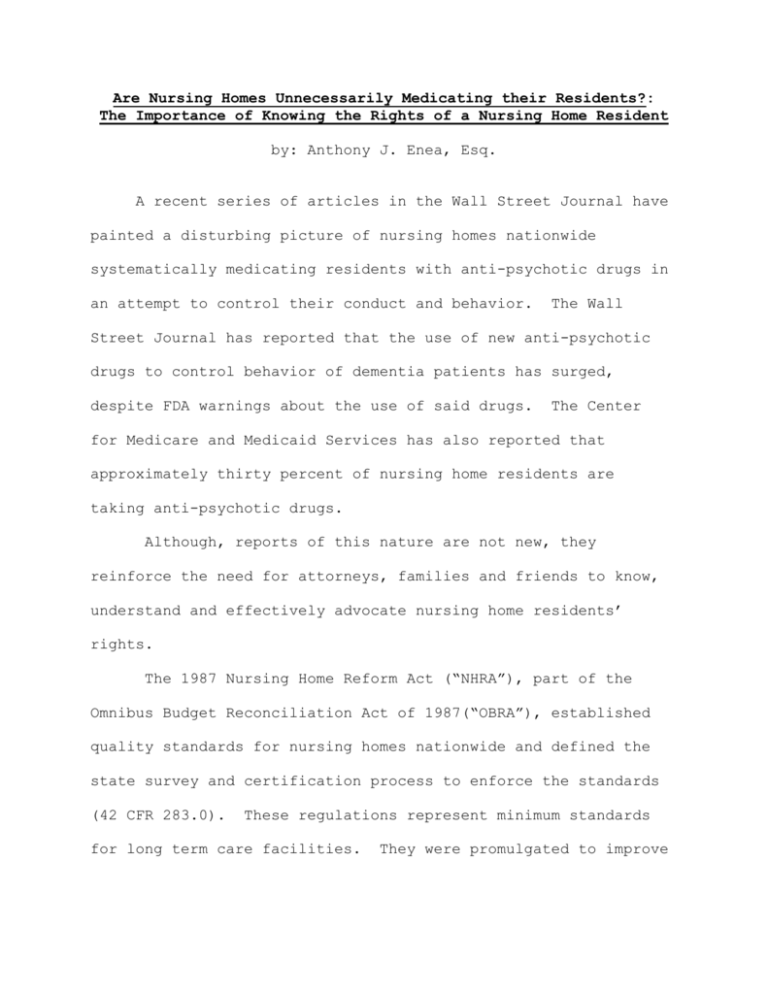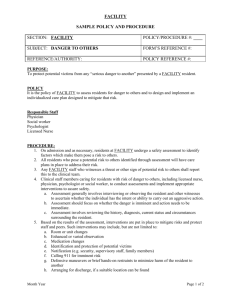Rights of a Nursing Home Resident
advertisement

Are Nursing Homes Unnecessarily Medicating their Residents?: The Importance of Knowing the Rights of a Nursing Home Resident by: Anthony J. Enea, Esq. A recent series of articles in the Wall Street Journal have painted a disturbing picture of nursing homes nationwide systematically medicating residents with anti-psychotic drugs in an attempt to control their conduct and behavior. The Wall Street Journal has reported that the use of new anti-psychotic drugs to control behavior of dementia patients has surged, despite FDA warnings about the use of said drugs. The Center for Medicare and Medicaid Services has also reported that approximately thirty percent of nursing home residents are taking anti-psychotic drugs. Although, reports of this nature are not new, they reinforce the need for attorneys, families and friends to know, understand and effectively advocate nursing home residents’ rights. The 1987 Nursing Home Reform Act (“NHRA”), part of the Omnibus Budget Reconciliation Act of 1987(“OBRA”), established quality standards for nursing homes nationwide and defined the state survey and certification process to enforce the standards (42 CFR 283.0). These regulations represent minimum standards for long term care facilities. They were promulgated to improve the quality of care of their residents. The general goals of OBRA are to: (a) promote and enhance the quality of life of the resident; (b) provide services and activities to attain or maintain the highest practicable, physical, mental and psycho social well being of each resident in accordance with a written plan of care; (c) provide that resident and advocate participation is a criteria for assessing the facilities compliance with administrator requirements; and (d) assure access to the State’s Long Term Care Ombudsman (a 3rd party resident advocate) to the facilities residents, and assure that the Ombudsman has access to records, residents and care providers. The goals are implemented by NHRA establishing the Resident’s Bill of Rights: The right to freedom from abuse, mistreatment, and neglect; The right to freedom from physical restraints; The right to privacy; The right to accommodation of medical, physical, psychological, and social needs; The right to participate in resident and family groups; The right to be treated with dignity; The right to exercise selfdetermination; The right to communicate freely; The right to participate in the review of one’s care plan, and to be fully informed in advance about any changes in care, treatment, or change of status in the facility; and The right to voice grievances without the discrimination or reprisal. A copy of the Bill of Rights must be conspicuously posted in the lobby of the facility. While these rights are general in nature, NHRA specifically defines the parameters of each right. For example, relative to medication, NHRA proscribes that a resident be free of unnecessary physical or chemical restraints, including anti-psychotic drugs and sedatives, except when authorized by a physician for a specified and limited period of time. Additionally, the NHRA specifically provides that: (a) facilities inform the resident of the name, specialty and means of contacting the physicians responsible for the residents care; (b) facilities must inform the resident, his or her guardian or interested family member of any deterioration of the resident’s health or if the physician wishes to change treatment; (c) facilities must provide the resident access to his or her medical records within one business day, and a right to copies of the records at a reasonable cost; (d) facilities must provide a written description of a residents rights, explaining state laws relevant to living wills, durable powers of attorney, etc., along with a copy of the facilities policy on carrying out these directives. This becomes particularly important when a facility refuses to honor the residents advance directive relevant to end-of-life decisions, the use of feeding tubes, ventilators and respirators; (e) the resident has a right to privacy, which extends to all aspects of care; and (f) a resident may not be moved to a different room, different nursing home, a hospital or back home without advanced notice, and an opportunity for appeal. In short, familiarity with OBRA and NHRA will provide the practitioner with a better awareness of protocols for the following relevant areas: Abuse, including unnecessary or excessive restraints. Pressure sores, infections, falls and fractures. Adverse drug reactions and over-medication. Nutrition, hydration, and unintended weight loss. Dining and Food Service. Sufficiency of staff, including nursing. Rehabilitative care, including physical therapy and speech therapy. As the baby boomers come of age it is inevitable that a significant number of them will spend some time in a nursing home. Knowledge of their rights will be of critical importance for their lawyers, families and friends. Anthony J. Enea, Esq. is a member of Enea, Scanlan and Sirignano, LLP. with offices in White Plains and Somers, N.Y. His firm concentrates its practice on Elder Law, Medicaid Planning, Medicaid Applications, Guardianships and Trusts and Estates Law, as well as Medical Malpractice and Nursing Home Negligence.






